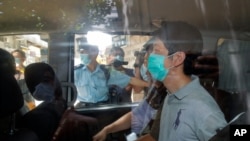Hong Kong police on Monday issued arrest warrants for eight self-exiled pro-democracy activists, charging them with national security offenses and offering a bounty of $127,635 each for information leading to their arrests.
Those targeted — Nathan Law, Anna Kwok, Finn Lau, Christopher Mung Siu-tat, Elmer Yuan Gong-yi and Kevin Yam, along with former lawmakers Ted Hui and Dennis Kwok — have been accused of colluding with foreign forces and incitement to secession.
Steve Li, senior superintendent with the Hong Kong’s national security department, told a Monday news conference the group violated Hong Kong’s national security law by calling on foreign countries to bring sanctions against Hong Kong and Chinese officials.
According to local media, Law, Mung Siu-tat and Lau are in Britain; Yuen Gong-yi, Anna Kwok and Dennis Kwok are in the U.S., and Yam and Hui are in Australia.
Although police won’t be able to arrest them if they remain abroad, “we won’t stop wanting them,” Li told reporters, adding that any who return and surrender could receive judicial leniency.
'I'm going to work harder'
Anna Kwok, executive director of the Washington-based Hong Kong Democracy Council, told VOA she had no plans to return to Hong Kong and her work in the U.S. will continue.
“Because of the campaign I've started last month against [Hong Kong Chief Executive] John Lee's entry into the United States, I think the government is quite insecure,” she said. “That's why out of desperation they have to do something like this, to really see how low they can get and to stop us from speaking out.
“I think I'm going to work harder now,” she added.
Ted Hui, a former lawmaker in Hong Kong’s Legislative Council, fled the city for Australia in 2021. A Hong Kong court in September sentenced him in absentia to three-and-a-half years in prison for contempt.
“I think the bounty is ridiculous and hilarious,” Hui told VOA. “It can only be a high-profile gesture without any legal effects. Free countries will not extradite us because of that. It only shows how powerless the [Chinese Communist Party] is in response to the Hong Kong diaspora who advocates for freedom and democracy.”
“The bounty does not change my situation or affect my personal safety at all,” he added.
A 'badge of honor'
Former Hong Kong-based lawyer Kevin Yam, an Australian citizen now based in Melbourne, told VOA he feels sad for his home city.
“I think any person who decides to speak out on Hong Kong issues overseas has got to be prepared for the possibility of something like this happening,” said Yam, a non-resident fellow at Georgetown Center for Asian Law.
“I was deluged with messages of congratulations saying, ‘it's a badge of honor.’ I don't feel that way,” he added. “I feel that when people say things like that, it's more that they think very poorly of Hong Kong authorities nowadays.”
Finn Lau, however, does view the bounty as a “badge of honor,” explaining that he wasn’t surprised by the warrant.
“The bounty reflects frustration of the Hong Kong government as they are now resorting to all means beyond the judiciary system to get the job done,” Lau Tweeted. “The risks of abduction, physical assault and other nonlegal ways to harass soar, but this would not stop the diasporic Hong Kong democratic movement.”
More than 250 arrested
The warrants come days after the third anniversary of the national security law enactment.
Imposed by Beijing following Hong Kong’s 2019 anti-government protests, the 2020 law carries a maximum punishment of life imprisonment for acts deemed secessionist or subversive, or for terrorism or colluding with foreign forces.
More than 250 people have been arrested on suspicion of violating the law, and authorities Monday said 79 people had been convicted for offenses, according to Reuters.
Beijing defends the law, calling it a necessity to stabilize the city in the wake of widespread civil unrest.
Eric Lai, a visiting researcher at the Dickson Poon School of Law at King’s College in London, called the warrants part of a campaign to intimidate dissidents living abroad.
“The press conference today illustrates that the Hong Kong government continues to expand transnational intimidation,” he told VOA. “Such practices do not conform with international human rights law when they criminalize free speech and peaceful political participation overseas.
“It is disappointing that the local court sponsors such practice of transnational intimidation by issuing warrants for the national security police,” he said.
Police officials, however, deny that they’re aiming to intimidate the activists.
"We are definitely not putting on a political show nor disseminating fear," Li, the police official, told the press conference.
Extradition unlikely
The security legislation states the law applies to both Hong Kong residents and non-residents in or outside of Chinese territory.
China’s state-owned Ta Kung Pao published a report in June stating that Beijing can request international cooperation from Interpol to apprehend fugitives overseas.
Whether that assistance would be given remains to be seen. The U.S., Britain and Australia all suspended extradition treaties with Hong Kong because of the security law.
“While some European countries remain [committed to] their extradition treaties with China or Hong Kong, the recent rulings of the European Court of Human Rights asserted that extradition to China does not conform to international and European human rights standards,” Lai said. “It is important to see whether countries embracing liberal values will commit to ensure full protections of exiled activists when they exercise their rights to free speech, free expression, and free peaceful political participation in their territories.”
Hong Kong’s Security Bureau spokesperson referred VOA to the government’s press release about the warrants when asked for additional comments.





